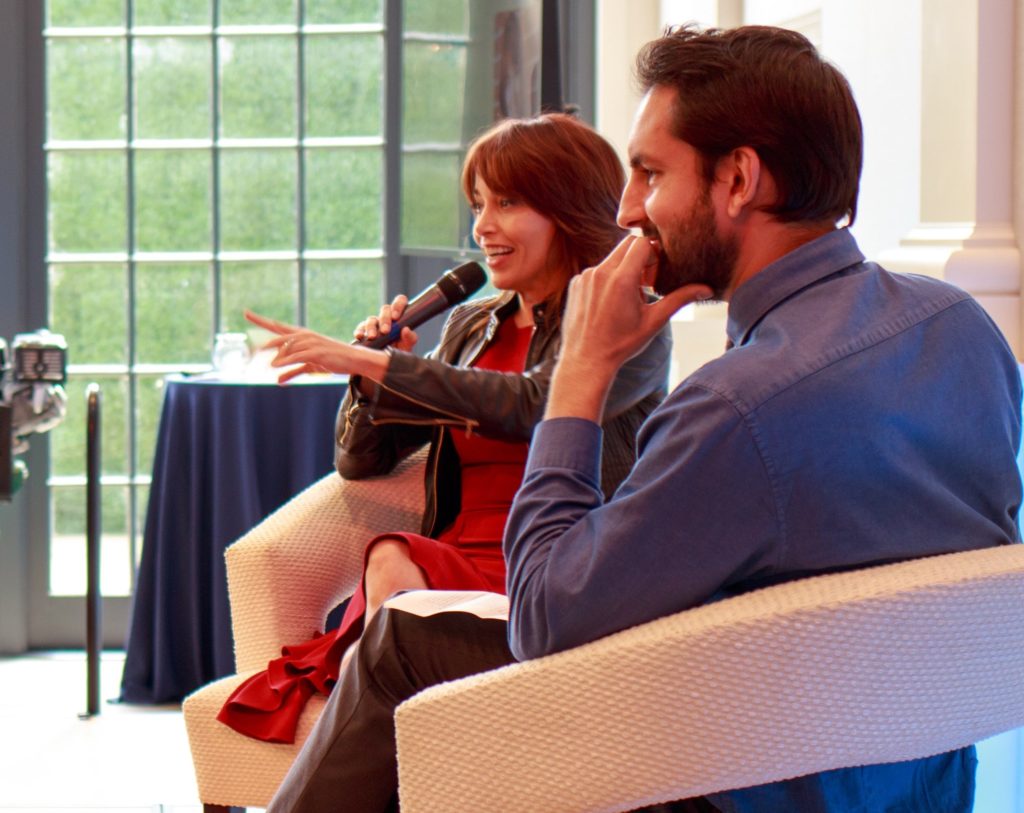Startups Big and Small: Halcyon’s New Cohort
By • September 14, 2017 0 867

In the business world, a lot of students have been competing for job slots at big businesses such as Goldman Sachs. But that’s not the full story.
On Sept. 12, at Halcyon House on Prospect Street in Georgetown, the seventh cohort of Halcyon Incubator showed a new type of businessperson coming to the surface — one that can be called the social entrepreneur archetype.
Erin Egan, vice president and chief privacy officer, policy, at Facebook, was at the event. She reminded people that Facebook also began as a startup. “We love the startup mentality. That’s the core of who we are,” she said, during a conversation on stage with Ryan Ross, program director for Halcyon Incubator.
Like the fellows — who pitched what they need at this point in their business lives, for example, money or social connections — Egan indicated that Facebook’s work isn’t complete and has to adapt to a variety of circumstances. Facework is working to make clear that the social media institution will not tolerate posts that feature violence, hate speech or anything else that would violate community standards.
Hearing the stories for how these social entrepreneurs came up with their business ideas, some recurring themes pop up. For example, a business idea can spring from personal experience. Ronnie Washington, founder and CEO of Onward Financial, told the story of how his uncle was in a situation where he had to depend on Washington for his safety net in a financial crisis.
From that personal story, the idea came to create a business where subscribers can use saving systems for events they would need to tap into emergency savings for, such as a flat tire or a parking ticket. With sudden costs that can go up to $400, such a incident can lead to a financial crisis. Washington’s company also offers financial tips and, after being subscribed for three months, emergency loans.
“We can create a 401K for everyone else,” he said.
Another story comes from Amira Idris, founder and CEO of TheraV. Her business idea sprang from a personal encounter with a man who lost a limb. Idris did research on the topic and discovered that losing a limb creates pain so significant that it can cost up to $8,000 a year to manage it.
With a business idea and research on hand, Idris decided to make a wearable device to deal with the pain. She has received feedback on her business enterprise, more than 20 pre-orders for the product and growing interest in what she is doing.
Brandon Anderson, founder of Raheem AI, also used research for his business idea, which is to have people write reviews on Facebook Messenger that are similar to Yelp, but about the police. The goal is to help curb police violence. In order to understand the extent of the social problem, Anderson did research and found that multiple instances of police violence don’t get reported.
“We can’t fix what we don’t know,” he said.
The complete list of fellows is: Brandon Anderson, founder of Raheem AI; Stephen Carter, cofounder of TRAXyL; Amira Idris, founder and CEO of TheraV; Joseph J. James, founder of Agri-Tech Producers; Karima Ladhani, founder and CEO of Barakat Bundle; Julia Peng, founder of VivaVax; Elliot Roth, founder of Spira; Danya Sherman, founder and CEO of KnoNap; Daniel Turner, cofounder of TRAXyL; and Ronnie Washington, founder and CEO of Onward Financial.
Halcyon, which grew out of the S&R Foundation and became an independent nonprofit this year, “seeks and celebrates creativity in all forms and galvanizes creative individuals aspiring to promote social good.”

